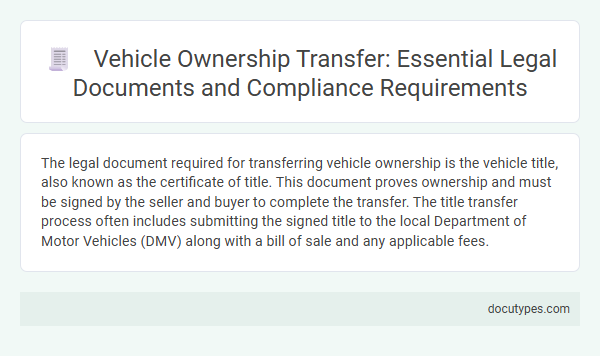The legal document required for transferring vehicle ownership is the vehicle title, also known as the certificate of title. This document proves ownership and must be signed by the seller and buyer to complete the transfer. The title transfer process often includes submitting the signed title to the local Department of Motor Vehicles (DMV) along with a bill of sale and any applicable fees.
Introduction to Vehicle Ownership Transfer
What legal document is required for transferring vehicle ownership? The primary document needed is the vehicle title, which serves as proof of ownership. This title must be signed by the seller and buyer to legally transfer the vehicle's ownership to the new owner.
Key Legal Documents Required for Transfer
Transferring vehicle ownership requires specific legal documents to ensure the process is valid and recognized by authorities. These documents serve as proof of ownership transfer and help update government records accurately.
- Vehicle Title Certificate - This document proves current ownership and must be signed over to the buyer during the transfer process.
- Bill of Sale - A legal receipt that records the details of the transaction, including buyer, seller, price, and vehicle information.
- Proof of Identification - Government-issued ID, such as a driver's license or passport, verifies the identities of both the buyer and seller.
Sale Agreement and Its Legal Significance
Transferring vehicle ownership requires a legally binding document to ensure clear terms between the buyer and seller. The sale agreement plays a crucial role in outlining the rights, responsibilities, and conditions of the transfer.
- Sale Agreement Definition - A legal contract that specifies the terms and conditions under which a vehicle is sold from one party to another.
- Proof of Ownership Transfer - Serves as concrete evidence facilitating the registration and legal recognition of new ownership by authorities.
- Protection Against Disputes - Establishes a clear record that can be used in case of disagreements or legal issues related to the sale.
Understanding the legal significance of the sale agreement is essential for a smooth and secure vehicle ownership transfer.
Registration Certificate (RC) Transfer Process
| Legal Document | Registration Certificate (RC) |
|---|---|
| Purpose | Official proof of vehicle ownership; mandatory for transferring vehicle ownership legally |
| Transfer Process Overview |
|
| Timeframe for Transfer | Typically within 30 days from the sale date to avoid penalties |
| Legal Importance | RC transfer ensures legal recognition of new ownership; prevents future liabilities for the previous owner |
| Applicable Laws | Motor Vehicles Act, 1988 and regional transport rules govern RC transfer procedures |
| Consequences of Non-Transfer | Seller may remain liable for traffic violations or other legal issues involving the vehicle |
| Verification | Buyers advised to verify RC details, encumbrance certificate, and any pending dues before transfer |
Role of No Objection Certificate (NOC)
Transferring vehicle ownership legally requires a No Objection Certificate (NOC) issued by the relevant Regional Transport Office (RTO). This document confirms that the original owner has no dues or pending liabilities on the vehicle.
The NOC plays a crucial role in ensuring a smooth transfer process by certifying that the vehicle is free from legal or financial encumbrances. You must obtain the NOC from the RTO where the vehicle is currently registered before registering it in a new location. Without this certificate, the transfer cannot be legally completed, preventing any future disputes over ownership.
Importance of Pollution Under Control (PUC) Certificate
Transferring vehicle ownership requires several legal documents, including the Registration Certificate (RC) and a valid Pollution Under Control (PUC) Certificate. The PUC Certificate is crucial as it certifies that the vehicle meets environmental emissions standards, ensuring compliance with pollution control laws. Without a valid PUC Certificate, the transfer process cannot be completed, making it an essential document in vehicle ownership transfer.
Road Tax Clearance and Payment Records
Transferring vehicle ownership requires a legal document that includes the road tax clearance certificate. This certificate verifies that all road tax payments are up to date and no outstanding dues exist. Payment records must be submitted to ensure compliance with local transportation laws during the transfer process.
Insurance Policy Transfer Formalities
When transferring vehicle ownership, the insurance policy transfer is a critical legal document ensuring continuous coverage. Your insurance provider must be notified to update the policy details to the new owner accurately.
- Notification to Insurer - Inform your insurance company promptly about the change in ownership to initiate the transfer process.
- Documentation Required - Provide a copy of the vehicle sale agreement and new ownership registration to the insurer for policy amendment.
- Policy Endorsement - The insurer issues an endorsement or new policy document reflecting the new owner's details, ensuring legal validity of coverage.
RTO Compliance and Documentation Checklist
Transferring vehicle ownership requires specific legal documents to ensure compliance with the Regional Transport Office (RTO) regulations. The primary document is the No Objection Certificate (NOC) issued by the seller's RTO, confirming that there are no pending dues on the vehicle.
Your application for ownership transfer must include the original Registration Certificate (RC), a valid insurance policy, and a copy of the sale agreement. The RTO also requires Form 29 and Form 30, duly signed by both buyer and seller, to complete the transfer process.
What Legal Document Is Required for Transferring Vehicle Ownership? Infographic

